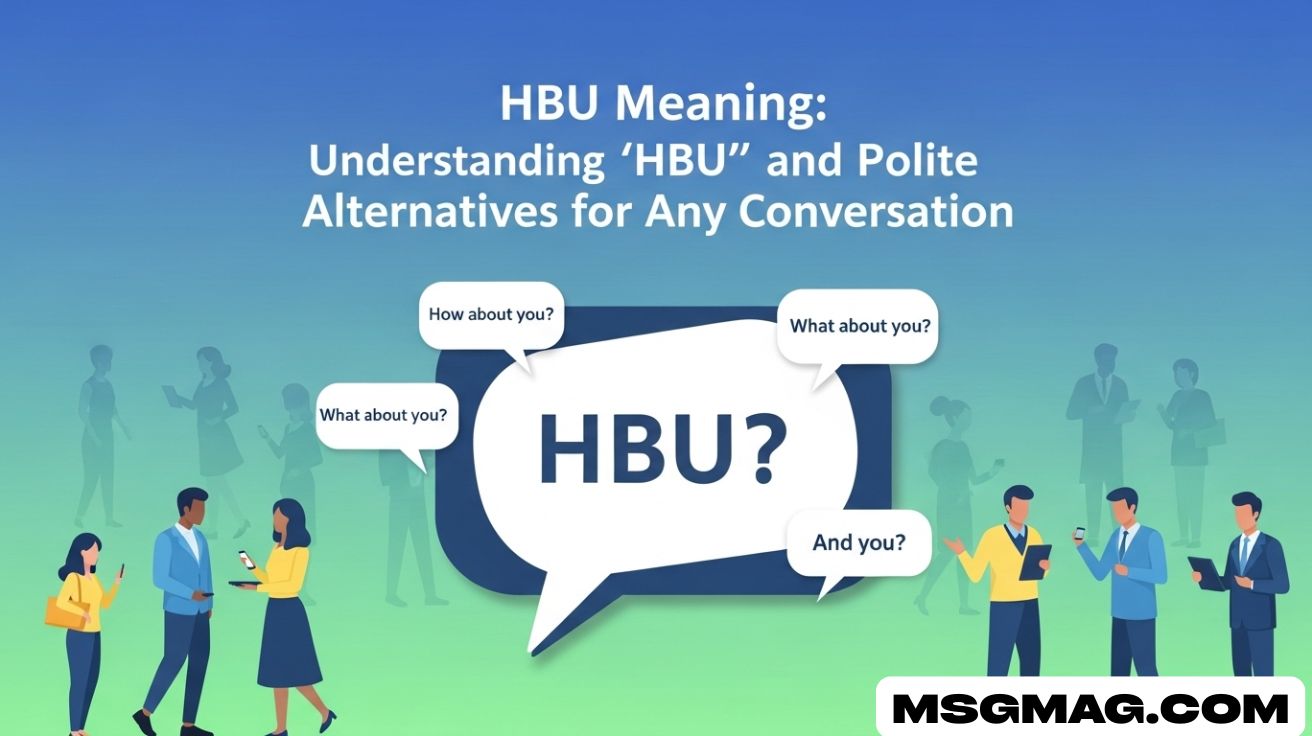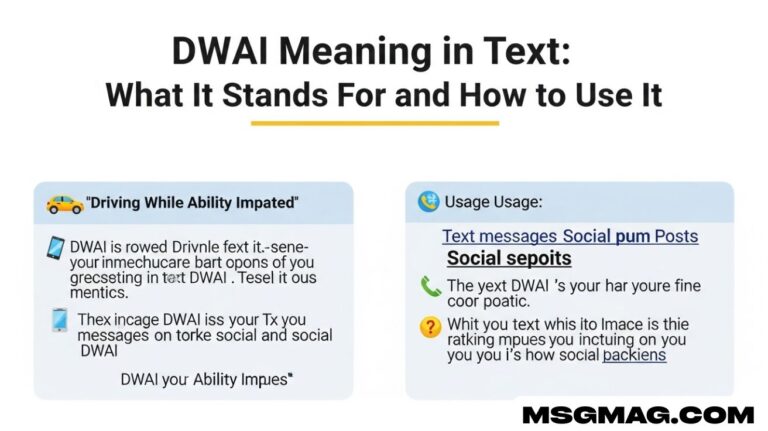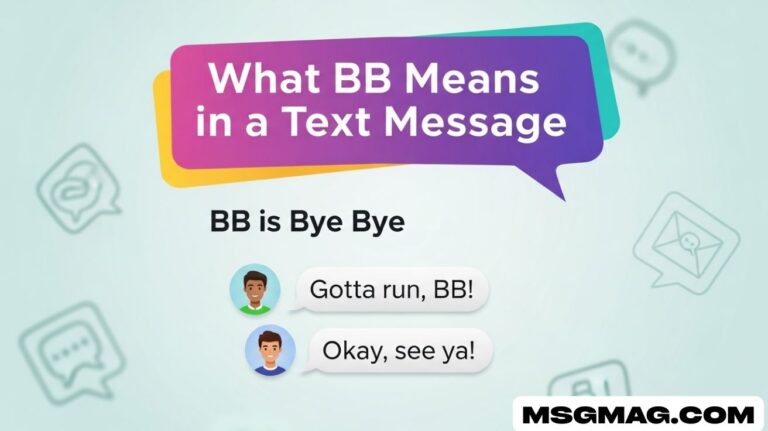HBU Meaning: Understanding “hbu” and Polite Alternatives for Any Conversation
“HBU Meaning” stands for “How about you?”. It is a short form used in texting and online chats. People use it to ask the other person about their thoughts or feelings.
You might see HBU in messages from friends, family, or colleagues. It is quick and easy to type. Using it keeps conversations active and friendly.
HBU is very common in casual texting. It is part of texting slang and internet shortcuts. Knowing its meaning helps you reply naturally and stay connected.
1. What Does “hbu” Mean?

The term hbu is an abbreviation of “how about you?”. Its purpose is simple: it shifts the focus of a conversation back to the other person. When someone shares an opinion or talks about their day, replying with hbu in messaging keeps the dialogue active and engaging. For example, if a friend texts, “I just finished my project,” replying with “hbu?” signals curiosity about their response.
The hbu texting meaning is casual and concise. It is commonly used among peers, in social media chat, or in informal settings where brevity is appreciated. Knowing what does hbu mean in casual texting helps you respond appropriately without confusing your audience.
2. Where Did “hbu” Originate?
The hbu origin can be traced back to the rise of SMS texting, instant messaging, and social apps like WhatsApp and Messenger. Early texting required brevity due to character limits, which gave birth to many texting acronyms such as BRB, LOL, and TTYL. Over time, hbu slang became a standard way to ask someone about themselves without typing the full phrase.
In addition to convenience, hbu in messaging reflects a style of communication designed for speed and efficiency. It is part of a broader internet slang dictionary and belongs to a collection of digital communication shortcuts that make texting quicker and more casual.
3. Why “hbu” Can Sound Too Informal
Although hbu abbreviation works perfectly in casual conversations, it can seem abrupt or too informal in professional or cross-generational communication. Using hbu in text in an email to a manager or teacher may come across as careless or unprofessional. Furthermore, some older adults or people unfamiliar with texting slang hbu meaning explained might not understand the abbreviation, which could cause confusion.
The casual tone of hbu in messaging also contrasts sharply with formal email language. Understanding informal vs formal chat is crucial to maintaining clarity and showing respect when communicating digitally.
4. Polite, Professional, and Casual Alternatives
Choosing the right expression instead of hbu depends on context, tone, and relationship. There are three main categories: polite/formal, neutral/everyday, and casual/colloquial alternatives to hbu.
A. Polite / Formal Alternatives
In professional emails, presentations, or academic discussions, phrases like “And how about you?”, “What about yourself?”, or “Could you please share your perspective?” are more appropriate. These options are considered professional ways to say hbu and are essential for maintaining online etiquette and proper communication tone tips.
B. Neutral / Everyday Alternatives
For friendly chats or casual team discussions, using neutral phrases instead of hbu keeps the conversation flowing without being too formal. Common choices include “How about you?”, “What’s your take?”, and “Your thoughts?”. These are suitable for peer-to-peer communication and strike a balance between politeness and casual friendliness.
C. Casual / Colloquial Alternatives
In texting with close friends or on social media, quick and playful options are best. You can simply say “You?”, “Your turn?”, or “Tell me what you think.” These casual alternatives to hbu are perfect for informal texting and keeping a conversation flowing in a natural, relaxed way.
5. How to Choose the Right Alternative
Selecting the best way to respond depends on three factors: tone of situation, relationship with the other person, and clarity and comprehension.
Tone of Situation matters because formal emails, job interviews, and professional chats require polite alternatives like “And how about you?”, while casual meetups or social chats can use “How about you?” or “You?”.
Relationship With the Other Person also plays a role. A client, teacher, or boss deserves formal phrasing, while colleagues or friends with rapport can handle neutral or casual alternatives.
Clarity and Comprehension are essential to avoid misunderstandings. When unsure, always write the full phrase, such as “How about you?”, to maintain readability and demonstrate respect. Following these steps ensures proper texting etiquette across audiences, whether you are texting teens, adults, or colleagues.
6. 11 Real‑World Examples
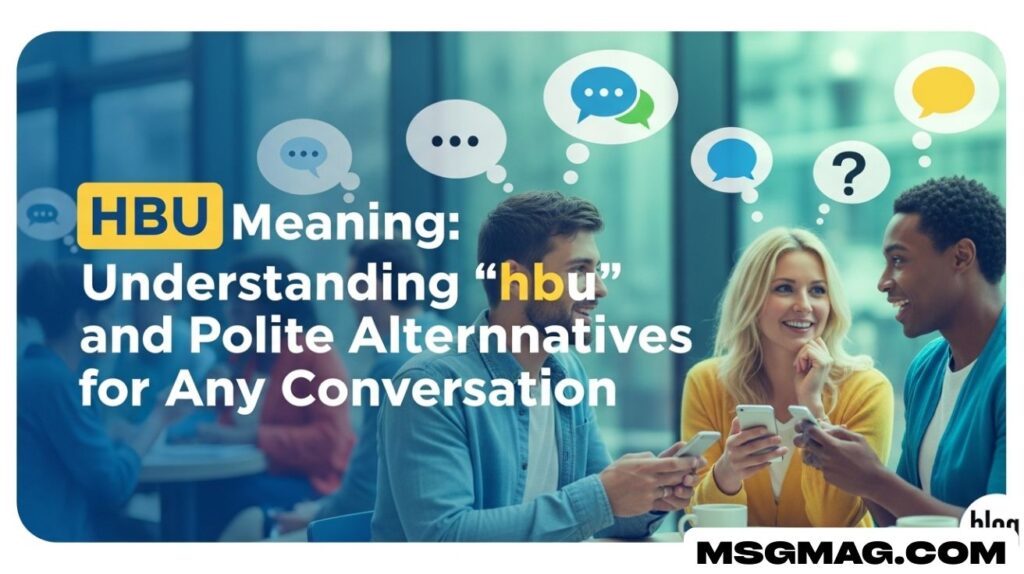
Here is a table of 11 practical examples showing hbu meaning and usage examples in different contexts:
| Situation | Example Phrase | Tone |
| Work Email | “Thank you for the update. And how about you? Could you please share your current status?” | Polite / Formal |
| Team Chat | “I’ve completed my draft; how about you?” | Neutral / Everyday |
| Texting Friend | “Just grabbed lunch, you?” | Casual / Colloquial |
| Group Chat | “Movie night this weekend? Your turn to decide!” | Casual |
| Project Discussion | “I’ve finished my section. What about yourself?” | Polite |
| Brainstorming Session | “I’m leaning toward option A—what’s your take?” | Neutral |
| Feedback Request | “I’d value your input. How do you feel about that?” | Formal |
| Quick Ping | “On my way, same question to you!” | Casual |
| Paper Review | “I’ve noted some edits; what about yourself?” | Formal |
| Lunch Invitation | “I’ll pick Thai; how about you?” | Neutral |
| Opinion Poll | “I like A. Tell me what you think.” | Casual |
These examples illustrate how hbu in text can be replaced effectively based on context, audience, and digital communication styles.
7. Nuances and Tone Explained
Different alternatives to hbu abbreviation carry subtle nuances. “And how about you?” signals politeness and respect, making it ideal for formal communication. The short “You?” is minimalist, suitable only among close friends. Phrases like “What’s your take?” are neutral, inviting opinions without formality. Lastly, “Tell me what you think.” balances friendliness and engagement, perfect for informal group chats. Recognizing these nuances helps maintain conversation etiquette and appropriate email vs chat language.
8. Why Variety Matters
Using only hbu in messaging can become repetitive and stale. Rotating between formal, neutral, and casual alternatives enhances tone, shows attentiveness, and improves readability. Variety also strengthens professional impressions in work communication while keeping chats lively among friends. Texting shortcuts guide, conversation starters, and digital communication shortcuts all benefit from varied phrasing.
9. Tips for Using These Alternatives
To use alternatives to hbu texting meaning effectively, consider your audience first. Tailor your tone to match formality, context, and relationship. Avoid overusing abbreviations in professional settings, and prioritize clarity. Mixing phrases like “How about you?”, “Your thoughts?”, and “Tell me what you think.” keeps communication fresh, professional, and friendly. Practicing these alternatives builds confidence and strengthens informal text expressions while maintaining proper online chat acronyms etiquette.
10. Common Pitfalls
Common mistakes include using casual alternatives with supervisors or overly formal phrases with close friends. Writing hbu? in emails can confuse recipients unfamiliar with texting for adults or younger audiences. Over-repetition of one phrase reduces conversational quality. Being aware of texting etiquette, peer-to-peer communication, and casual vs formal messaging ensures smooth interactions across all platforms.
Read Also : Lumon Definition and Meaning: What It Stands For in Text
Understanding the Role of “hbu” in Texting
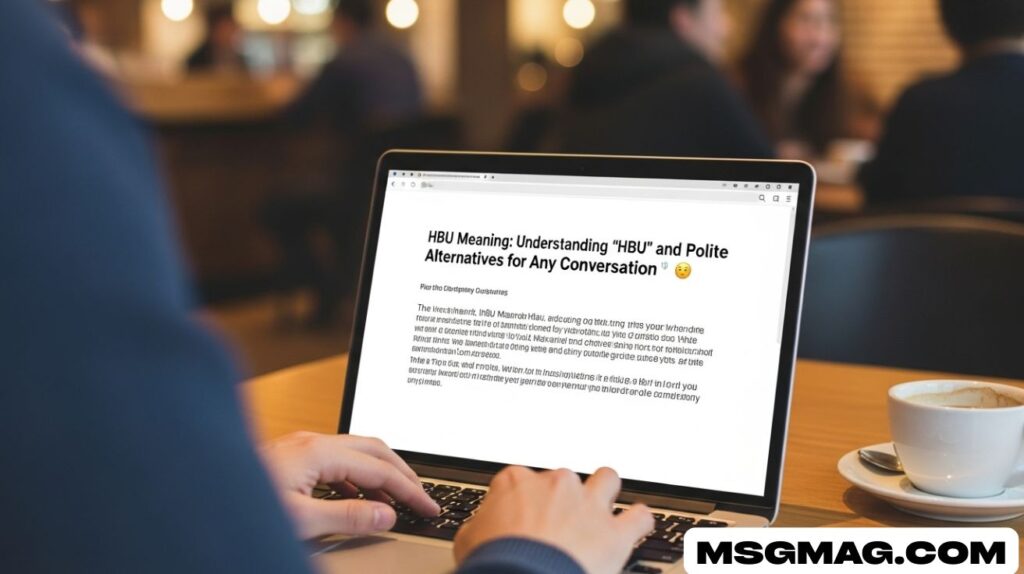
The abbreviation hbu, short for “how about you?”, is widely used in texting and social media chats. Its main purpose is to keep conversations active by redirecting attention to the other person. Knowing what does hbu mean helps users engage in smooth peer-to-peer communication and maintain casual yet polite interactions across different messaging platforms.
Using hbu in text is convenient, but it is part of a broader set of texting acronyms and online messaging slang. Understanding these digital communication shortcuts allows users to respond appropriately depending on the relationship with the recipient. Texting effectively involves knowing conversation starters and informal text expressions that match tone and context.
How “hbu” Became Popular in Digital Chats
The rise of SMS, instant messaging, and social media fueled the creation of hbu slang and other chat abbreviations. As character limits and fast-paced communication became standard, shortcuts like hbu in messaging offered efficiency and clarity. Learning the hbu definition helps users understand modern texting shorthand.
Hbu origin shows it emerged from casual, peer-to-peer communication among friends and colleagues. Recognizing its context ensures you don’t misuse it in formal emails or professional settings. Proper use enhances online etiquette and guides communication tone tips, helping conversations flow naturally without confusion or misinterpretation.
The Informal Nature of “hbu”
While hbu in text is perfect among friends, it can feel too casual or abrupt in professional or cross-generational communication. Using it in emails or LinkedIn messages may appear careless. Understanding informal vs formal chat ensures you match your language to the audience and setting.
Recognizing the casual tone of texting slang hbu meaning explained allows users to select neutral phrases instead of hbu when necessary. Digital communication styles differ between friends and colleagues, and clarity is crucial for avoiding miscommunication in any digital communication shortcut or social media chat.
Polite Alternatives for Any Situation
In professional or academic settings, using professional ways to say hbu demonstrates respect and attentiveness. Phrases like “And how about you?” or “Could you share your perspective?” are polite alternatives. They maintain proper online etiquette and email vs chat language standards while keeping the conversation interactive.
Even in casual settings, rotating between neutral phrases instead of hbu and casual alternatives to hbu prevents monotony. By learning these texting acronyms and conversation starters, users improve engagement and maintain clarity. Proper alternatives enhance readability and encourage meaningful dialogue across all digital communication styles.
Choosing the Right Alternative for Your Audience

Selecting the correct phrase depends on tone, relationship, and clarity. Formal emails or client communications benefit from polite alternatives to hbu, while friendly chats can use neutral phrases instead of hbu. Recognizing context is key to maintaining proper conversation etiquette.
Understanding your audience, whether texting for adults, texting for teens, or peer-to-peer communication, ensures effective responses. Knowing how to respond to hbu in text keeps conversations engaging and avoids awkward or unclear messages. Matching tone and context is essential for successful digital communication shortcuts.
Enhancing Conversations Beyond “hbu”
Using just hbu in messaging repeatedly can make conversations feel bland. Incorporating casual conversation phrases, informal text expressions, and varied chat slang meanings improves dialogue and engagement. This helps you maintain keeping a conversation flowing naturally.
Adding context to questions, like “What’s your take?” or “Tell me what you think,” shows interest and politeness. Understanding texting shorthand, texting etiquette, and digital communication styles ensures your messages are clear and well-received in any informal or professional setting.
FAQ,s
Is it WBU or HBU?
It’s HBU, short for “How about you?”; WBU is also a common alternative with the same meaning.
What does FCK stand for?
It is often used as a censored form of the word “fuck” in texting or online slang.
What does “WYD” mean in texting?
WYD stands for “What are you doing?” and is used to ask about someone’s current activity.
Is it HBU or HBY?
The correct abbreviation is HBU, meaning “How about you?”; HBY is rarely used.
Conclusion
Understanding hbu meaning, its origin, and its appropriate use is essential in modern communication. By choosing the right polite alternatives to hbu, you can adapt to any conversation, whether it’s casual texting, professional emails, or social media messaging. Awareness of texting acronyms, chat abbreviations, and digital communication shortcuts helps you maintain clarity, respect, and tone. Mastering these alternatives will improve your conversations, making them engaging, polite, and context-appropriate across any digital platform.

